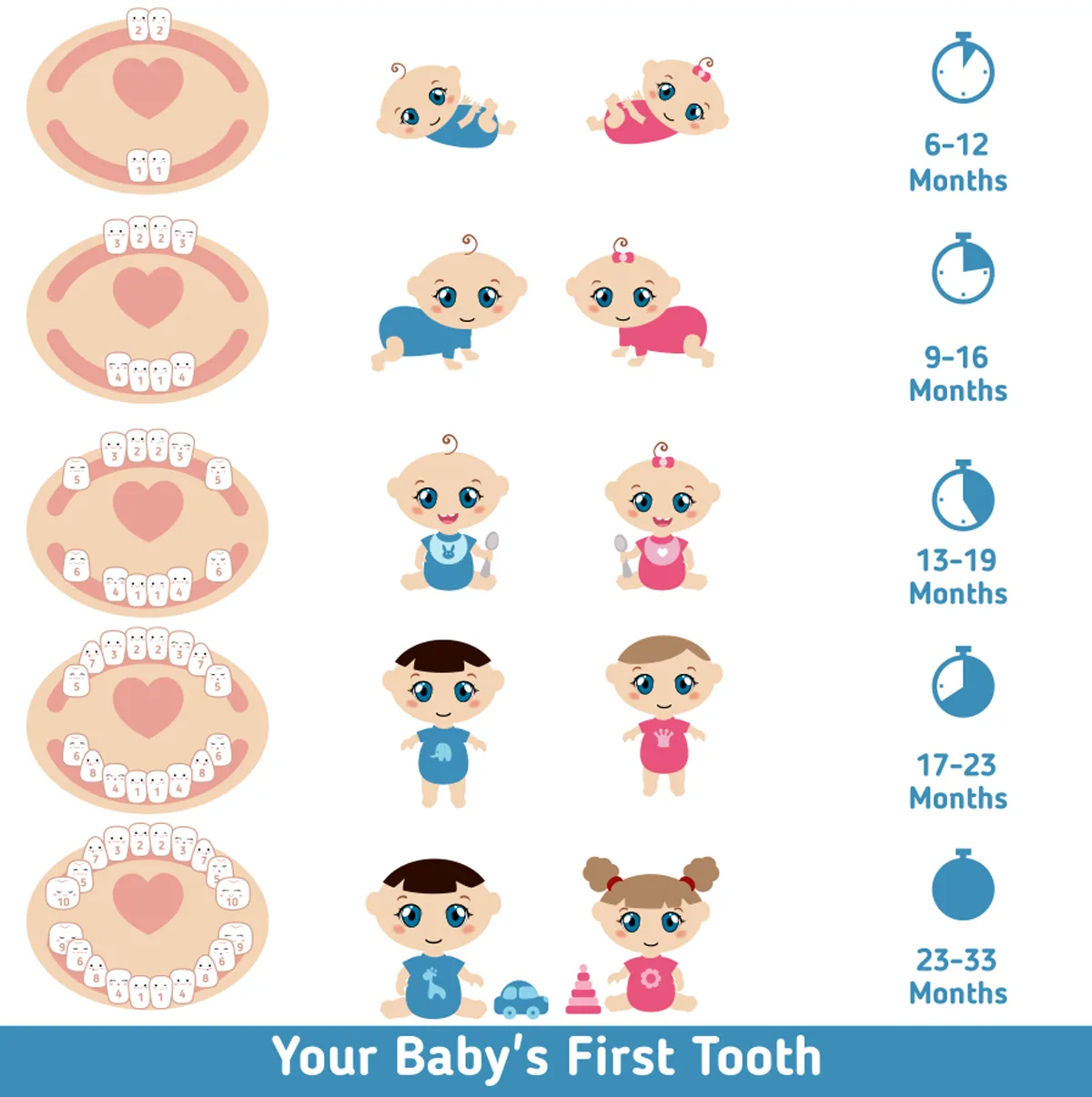It’s hard to beat the feeling when you see joy spread across your baby’s face for the first time! We may be called Simply Teeth, but we are here for those first cute gummy smiles too!
Your child’s personal and oral development is one of life’s greatest joys and responsibilities. Begin paying attention to your child’s oral health while their smile is still gummy, and you set the stage for the wonderful debut of pearly whites that stay healthy for life. Spend a moment to learn how to smooth out the teething process and set the right habits for every stage of infant oral development.
Your child’s baby teeth, also known as primary or milk teeth, are far from disposable. In fact, proper care for baby teeth is essential to safeguard speech development and proper chewing, not to mention keeping them strong in their vital role as placeholders for the permanent teeth to come. Baby teeth typically begin erupting when your child is around 6 months old, with the full set of 20 baby teeth usually in place by age 3.
Baby tooth development stages
Before they erupt (0–6 months): Baby tooth development is a fascinating journey that begins long before those first teeth appear. From the moment your baby is born, their gums are preparing for the arrival of those tiny teeth.
In the first 6 months of life, while you may not yet see any teeth, they are already present beneath the surface. The gums are actively developing ridges, where the teeth will eventually emerge. During this period, increased drooling and fussiness may accompany it, serving as early signs that teething is on the horizon. To help alleviate your baby’s discomfort during this time, gentle gum massage or a chilled teether can provide soothing relief.

Eruption (6–36 months): The process of baby teeth eruption is truly fascinating, and while there’s a typical order, it’s important to understand that some variation is perfectly normal. Here’s a detailed breakdown of the usual sequence:
1. Central incisors: These are the pair of front teeth on both the upper and lower jaw. They usually break through first, typically appearing between 6 and 10 months of age.

2. Lateral incisors: Following the central incisors are the adjacent teeth known as lateral incisors. They tend to emerge next, usually between 9 and 16 months.
3. First molars: These are the back teeth used for grinding food. Interestingly, first molars often appear before the canines, erupting between 13 and 19 months.
4. Canines: These pointed teeth, also called cuspid teeth, are situated beside the lateral incisors. They typically come through between 16 and 23 months.
5. Second molars: Completing the set of baby teeth are the second molars, located furthest back in the jaw. They usually make their appearance between 23 and 33 months.
While these are general guidelines, the timing of tooth eruptions can vary by a few months from child to child. As long as the teeth are making their appearance within a reasonable timeframe, there’s usually no cause for concern. However, it’s important to be aware that teething can sometimes bring discomfort, such as increased fussiness, excessive drooling or a low-grade fever.
It isn’t always smooth sailing, and if things start to get rough it’s important to get help. Suppose you observe a significant delay in eruption or notice anything unusual, such as prolonged fever or small, white bumps on the gums known as eruption cysts. In that case, it’s advisable to consult your dentist for appropriate guidance and peace of mind.
Oral care for baby teeth
Caring for your child’s teeth is essential right from the start, even before those precious pearly whites emerge. Here’s how you can establish excellent oral hygiene habits for your little one:
Before first tooth (0–6 months): Even though you won’t see any teeth yet, always keep your baby’s mouth clean. After feedings, gently wipe their gums with a damp washcloth. This simple practice helps remove bacteria and prepares their delicate gums for brushing once the teeth begin to come in. Starting early helps lay the foundation for a lifetime of healthy oral care habits.
First tooth to age 3: As brushing becomes part of your baby’s daily routine, it’s a moment to rejoice! Start by using a soft-bristled infant toothbrush and water to clean their teeth twice a day. Once your dentist gives the green light (usually around 18 months), you can introduce a pea-sized, low-fluoride toothpaste specially formulated for young children.
At this stage, as a parent or carer, you’re responsible for leading the brushing routine. Using a gentle circular motion, brush along the gum line and cover all tooth surfaces thoroughly. Transitioning from the washcloth to the toothbrush can be a gradual process, so make it enjoyable and engaging for your little one. This not only fosters good oral hygiene but also creates positive associations with dental care from an early age.
Age 3 and beyond: As your child’s teeth begin to touch, usually around age 3, you can consider introducing flossing to their oral care regimen. It’s essential to consult your dentist to determine the best flossing technique suitable for your child’s age and oral health. Additionally, consider transitioning to a pea-sized amount of regular fluoridated toothpaste, ensuring they receive the necessary protection against cavities.
While your child learns to brush and floss independently, remember to supervise their oral care routine until they develop the skills to do it well on their own, typically around ages 6 to 8.
Diet for healthy baby teeth
Sugary drinks and snacks are the archenemies of your child’s teeth. To protect their oral health, limit sugary treats and instead encourage water or unsweetened milk as preferred beverages. When it comes to snacks, choose wholesome alternatives like fruits, vegetables, cheese or yoghurt, which nourish their growing bodies and help maintain oral hygiene.
The Australian Dental Association advises scheduling your child’s first dental visit by age 1 or when their first tooth appears. These early appointments help dentists monitor oral development, identify potential issues early and educate parents on proper oral care. Regular check-ups are crucial for cavity prevention and ensuring a healthy, long-term smile.
Keeping your little one’s smile safe and healthy
Teething pain and discomfort: Teething can be tough for your baby, but there are safe and effective ways to ease their discomfort. Consider offering chilled teethers, gently massaging their gums or using over-the-counter pain relievers as prescribed by your dentist or paediatrician.

Thumb sucking and dummy use: Thumb sucking and dummy use are common self-soothing behaviours in babies and young children. While they can provide comfort and help babies relax, prolonged or intense thumb sucking and pacifier use can potentially affect the alignment of the teeth and the development of the jaws.
Seek personalised advice from your dentist, as they can assess your child’s oral health and development and provide tailored recommendations based on their needs. Your dentists can offer guidance on the best strategies for encouraging the child to discontinue thumb sucking or pacifier use in a gentle and supportive manner, while also monitoring their oral health to address any potential issues that may arise.
Baby bottle tooth decay: This preventable condition occurs when sugary liquids, such as juice, milk, or formula, pool around a baby’s teeth for extended periods, typically during sleep or prolonged bottle-feeding sessions. Bacteria in the mouth feed on the sugars in these liquids, producing acids that attack the tooth enamel, leading to decay and cavities.
Never put sugary liquids in bottles, avoid using a bottle as a pacifier, and ensure regular cleanings with a damp washcloth. As your baby gets older, transition them to a cup by 12 months.
Dental emergencies: In the case of a chipped or knocked-out tooth, it’s important to take action promptly. Contact your dentist right away for guidance on what to do next. Acting swiftly helps ensure the best possible outcome and minimises any potential complications.
Building a lifetime of healthy smiles
Your baby deserves a healthy foundation of oral health. Start building it early and will pay off in a big way in the long run. Good habits established from the beginning sets the stage for a lifetime of oral wellness. Remember, even small steps towards good oral hygiene can make a big difference!
You have powerful allies in your quest, so be sure to make regular dental check-ups and consultations with your dentist or paediatrician. That way you can get expert treatment and advice, addressing any questions or concerns you may have. It really is worth keeping your connections to your health care team strong so you can enjoy this wonderful time with health, confidence and endless smiles!




